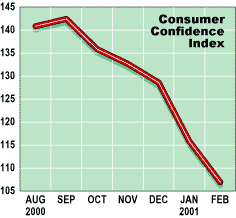
HOT TOPICS LIST
- Strategies
- Stocks
- Buy
- Investing
- Brokers
- Psychology
- Interviews
- Accumulate
- Sell
- Hold
- Spotlight
- Websites
- Candlestick Corner
- Gold & Metals
- Options Trading
LIST OF TOPICS
MARKET COMMENTARY
Let The Buyer Beware
03/26/01 11:09:46 PM PSTby Jayanthi Gopalakrishnan
Let The Buyer Beware
| The chart of the consumer confidence index (CCI) says it all. Yes, consumer confidence has declined sharply -- no surprise, considering the broader market indexes are at or close to their lowest levels in two years; corporations have been announcing layoffs and cutbacks in capital spending and labor; there are problems with excess inventories; and, to top it all off, housing sales declined in January despite the drop in mortgage rates. The big question now is, "Are we in a recession?" The CCI has become the important indicator to watch. Its sharp drop in February, to well below expectations, was enough to spook anyone. Why the emphasis on consumer confidence? Believe it or not, the average US household has a tremendous influence on the direction of the economy. Consumer confidence makes up about two-thirds of the Gross Domestic Product (GDP); as consumers get more cautious and spend less, it will mean further deterioration.
This kind of decline in consumer confidence is enough to spook anyone. True, the CCI is a lagging indicator, and it's typical for consumer confidence to decline when GDP slows. According to a report released by Economy.com, in past recessions consumer confidence started declining two years before a recession. Based on this analysis, it is likely that the current slowdown may be warning of slow growth, which could lead to a recession. At this point, it is really not severe enough to suggest that we are in a recession, but that doesn't mean it should be ignored. The CCI will also be slow to bounce back after the economy starts its path to recovery, because consumers will be hesitant and will only increase their confidence once they are certain the recovery is in full force. IT'S A BLEAK PICTURE, FOLKS In addition to consumer confidence, other indicators also suggest a bleak picture. A poll conducted by The Economist revealed that forecasters have lowered their expectations of growth to 1.8%, a sharp drop from the 3% forecast in December 2000. Although growth is getting close to negative levels, it is still in positive territory, albeit modestly. New-home sales and durable goods fell in January 2001. There's weakness in the manufacturing sector, inventories have been piling up, and consumer debt has increased. The recent rise in energy prices only adds to the worsening situation. Editor Jayanthi Gopalakrishnan can be reached at Jayanthi@Traders.com. |
Staff Writer
| Title: | Staff Writer |
| Company: | Technical Analysis, Inc. |
| Address: | 4757 California Ave SW |
| Seattle, WA 98116 | |
| Phone # for sales: | 206 938 0570 |
| Fax: | 206 938 1307 |
| Website: | working-money.com |
| E-mail address: | Jayanthi@traders.com |
Traders' Resource Links | |
| Charting the Stock Market: The Wyckoff Method -- Books | |
| Working-Money.com -- Online Trading Services | |
| Traders.com Advantage -- Online Trading Services | |
| Technical Analysis of Stocks & Commodities -- Publications and Newsletters | |
| Working Money, at Working-Money.com -- Publications and Newsletters | |
| Traders.com Advantage -- Publications and Newsletters | |
| Professional Traders Starter Kit -- Software | |
PRINT THIS ARTICLE

Request Information From Our Sponsors
- StockCharts.com, Inc.
- Candle Patterns
- Candlestick Charting Explained
- Intermarket Technical Analysis
- John Murphy on Chart Analysis
- John Murphy's Chart Pattern Recognition
- John Murphy's Market Message
- MurphyExplainsMarketAnalysis-Intermarket Analysis
- MurphyExplainsMarketAnalysis-Visual Analysis
- StockCharts.com
- Technical Analysis of the Financial Markets
- The Visual Investor
- VectorVest, Inc.
- Executive Premier Workshop
- One-Day Options Course
- OptionsPro
- Retirement Income Workshop
- Sure-Fire Trading Systems (VectorVest, Inc.)
- Trading as a Business Workshop
- VectorVest 7 EOD
- VectorVest 7 RealTime/IntraDay
- VectorVest AutoTester
- VectorVest Educational Services
- VectorVest OnLine
- VectorVest Options Analyzer
- VectorVest ProGraphics v6.0
- VectorVest ProTrader 7
- VectorVest RealTime Derby Tool
- VectorVest Simulator
- VectorVest Variator
- VectorVest Watchdog

